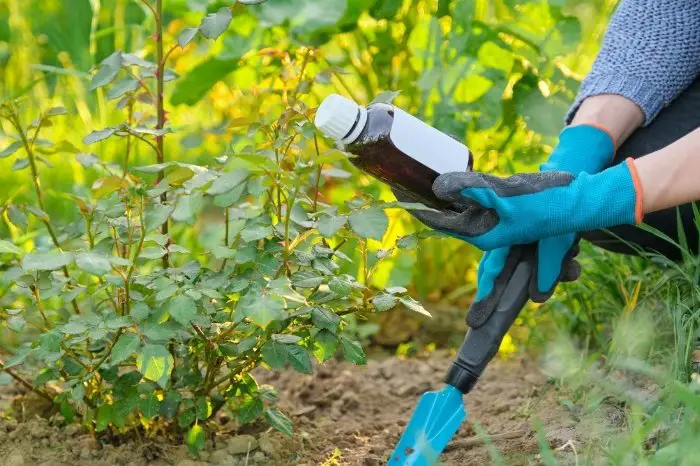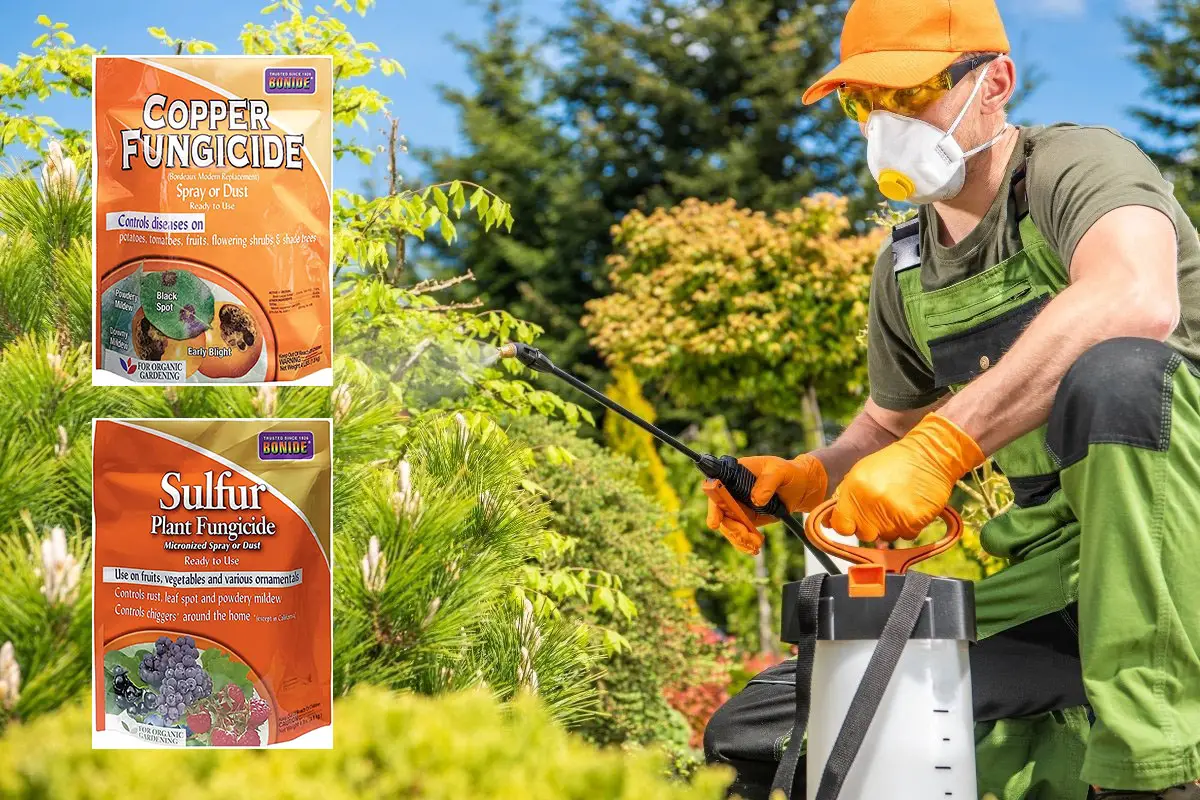Last Updated on July 31, 2022 by Griselda M.
If you are wondering which fungicide is better between copper vs sulfur fungicide, we will look at both in this article and see how they work, and where they work.
In the field of agriculture, the application of fungicides is very important for the prevention and control of diseases. Fungicides can be divided into three main categories: chemical, biological and physical. In this article, we will compare two of the most widely used chemical fungicides in the world: copper vs sulfur fungicides.
Copper Fungicide
Copper fungicide is a kind of chemical fungicide, and it is used to prevent and control diseases caused by fungi. The active ingredient of these fungicides is copper.
These fungicides are not very harmful to human health, but they have some disadvantages. For example, a copper fungicide cannot be applied in late spring and early autumn because the soil is too wet. Moreover, a copper fungicide cannot be applied to crops with high water content.
Click here to get info about:
- Sunflower Petals Turning White – How To Stop This?
- All You Need To Know About Jade Plant Aerial Roots
Most Effective And Safe Way Of Using Copper Fungicide
Apply copper fungicide in the form of powder or granules
The copper fungicide should be applied directly to the crop plants at a rate on the label. You can spray it on the whole crop but it is better to apply it to the seedlings and leaves of the plants. If you spray it on the soil, the fungicide will not penetrate the roots.
Spray as per label instructions
If you look on the label – here is an example – you will see instructions are given for how to apply the product to different plants, and when. Do not deviate from these instructions as they are best practice and work.
Sulfur Fungicide
Sulfur fungicides are also a kind of chemical fungicide. These are widely used in the field of agriculture. The active ingredient of the fungicide is sulfur, which has a strong antifungal effect on the microorganisms that cause plant diseases.
Bonide Sulfur Plant Fungicide Dust, 4 lbs
All fungicides has limitations, and there are cases where sulfur fungicides have efficacy where copper fungicides lack. Hence they compliment each other. However, sulfur fungicide has some drawbacks. It is hard to apply, and it cannot be used in late spring and early autumn.
Differences Between Copper Vs Sulfur Fungicide
Having learned about each of these fungicides, let’s learn the differences they carry. Their differences include:
Copper acts by disrupting many proteins in the fungi. Fungi generally have quite absorbtive surfaces compared to plants, so we are able to selectively target the fungi. If you look at powdery mildew growing on a leaf, the copper will kill the powdery milder faster than it kills your plant, meaning that you are able to help your plant.
This does not mean that copper will not kill your leaves – I have burnt plants when it is hot, or humid – copper is toxic – it just kills fungi faster than plants. Be careful.
Sulfur fungicides have a different mode of action – one of which is that enzymes in the fungus can actually produce hydrogen sulphide – which is toxic to metabolism. I was speaking to a guy who grows cannabis who swears that “sulfur is natural” and hence safe ….. after lighting some sulfur he inhaled the smoke and started coughing, the point was made.
Both of these fungicides are highly effective, and it is a useful trick to rotate any treatment that you use. Hence if you treat with copper fungicide one month, use sulfur fungicide the next month.
I generally try to use as little of either fungicide as I can – you must understand that fungicide washes off the leaves and leaches into your soil. Soil fungi are really important to your plants, so the last thing you should really ever do is to try and fix the leaves of your plant and kill the fungi that feed its roots!
Fungi attack weak plants – if your plants are healthy, you will not get fungal problems. To get plants healthy, we need to ensure they have adequate sunlight, adequate (but not too much) soil nutrition, and decent ventilation (wind movement). I also irrigate my plants on the leaves with water from my duck pond – this water is really disgusting and full of beneficial gut bacteria that got pooped in the water by the ducks.
If you do not have the luxury of a duck pond, you can always get a bit of horse manure and soak it in a bucket for a week with a bit of molasses added. Spray this bacterial enriched solution on your plant leaves. The beneficial bacteria in this mix will help to make the leaf conditions undesirable to fungi.

Similarities Between Copper Vs Sulfur Fungicide
Both kill fungi!!
The modes of action are different – copper disables fungal proteins inhibiting their growth, and sulfur disables the fungi from being able to produce energy and probably a whole lot of other things that we must still discover. This means that both kill fungi, but do so in a different way.
However, both are relatively “harmless” fungicides. Never believe that just because something has been used for a long time it is “safe”. But these fungicides have been used for long enough that we know what the risks are. Some newer fancy fungicides being released onto the market now are far more synthetic engineered compounds, and we will only probably find out in twenty years what trouble they cause.
When choosing fungicides, it is important to consider the disease you are trying to control, the crop you are growing, and the fungicide’s mode of action. Sometimes, rotating fungicides that have different modes of action is the most effective way of achieving control.
In Conclusion
Copper vs sulfur fungicides are two fungicides used for different purposes but are successful in eliminating diseases from your plants. Fungicides have a wide range of different properties and each type has its own characteristics.
Copper is a very broad-spectrum fungicide that can be used to control a variety of diseases including powdery mildew, leaf spot, gray mold, and downy mildew.
Sulfur is also an excellent fungicide, and it has been used in some or other form since ancient times. Once you learn how to use it, you can use it in your local conditions to control problems. I find sulfur a bit fiddly, and when I have used it I have sometimes got rid of the fungi, and sometimes burnt my plant. You will have to learn what works for you. I however do prefer this to copper fungicides as I find the impact on my soil fungi seems to be less.
FAQ’s
Is copper or sulfur a better fungicide?
Copper fungicide is considered a better fungicide since its easy to apply on plants. There are however times when sulfur fungicides are more suitable. This is a bit like asking if a knife or spoon are better. Both have their place.
Can I mix sulfur and copper fungicide?
My general advice would be to avoid this. Copper fungicides are often in the form of copper soaps - the chemistry of this will fight with most sulfur applications. If the two were compatible, we would expect "mixed" products on the shelf. These are not common. Follow label instructions for each fungicide and avoid short cuts.
When should you not use a copper fungicide?
If you have very hot dry weather and very hot humid weather you can find copper fungicide can burn the leaves if applied too often. If you are producing a product such as cannabis bud for smoking, applying copper fungicide to buds can leave toxic copper residues that will be inhaled. This is not ideal.
Is sulfur a good fungicide?
Yes, sulfur is very effective for preventing and controlling diseases on fruit. It is very effective against powdery mildew and gray mold. It is also good for brown rot, and black spot. However, sulfur is not as good at controlling downy mildew, which is one of the most common diseases of apples.
Caroline is a gardener who loves to get down to the nitty–gritty of gardening. She proudly proclaims herself as a ‘dirt worshipper‘ and can often be found deep in the garden, covered in soil and singing to her plants. As a self–proclaimed ‘plant whisperer‘, Caroline believes that plants need love and attention just like any other living thing, and she loves to give them both. When she‘s not tending to her garden, you can often find her researching the latest gardening trends, or teaching others how to make their gardens thrive


